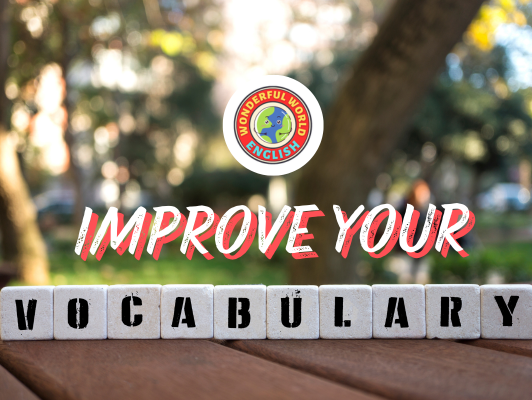Contents
Toggle
Meet David De’ Ath, founder, editor, and writer at Wonderful World English. With his extensive background as an English teacher, David provides valuable insights and practical tips on ESL for students and teachers alike.
Expanding one’s vocabulary can be a transformative endeavor, both personally and professionally.
It enhances one’s ability to express thoughts precisely and comprehend complex texts.
Embarking on a 30-day challenge to improve your vocabulary is a practical goal.
It provides a focused framework that can result in tangible progress.
Approaching this task with purposeful strategies, setting attainable language goals, and immersing oneself in a variety of English resources can result in significant enhancements in vocabulary.
To foster vocabulary growth, it is essential to integrate new words into everyday use and to engage with language across diverse contexts actively.
This can involve blending traditional methods, such as reading and vocabulary lists, with modern techniques, including language apps and interactive platforms.
Creating a vocabulary-friendly environment by surrounding oneself with English in all forms—books, music, conversations, and digital media—can provide continual learning moments.
Consistency in practice and periodic assessment of one’s progress is also crucial in overcoming plateaus and maintaining the trajectory toward reaching your 30-day language goals.
Key Takeaways
- A structured 30-day plan accelerates vocabulary development.
- Diverse methods and consistent practice enhance word retention.
- Ongoing assessment helps refine vocabulary expansion strategies.
Crafting Your Vocabulary Roadmap
Improving one’s vocabulary requires a structured approach with clear objectives and the right tools.
By setting milestones and leveraging various technologies, one can steadily enhance one’s language proficiency.
Setting Achievable Goals
One starts by defining specific, measurable objectives.
They may aim to learn a certain number of new words each day, which can be tracked using a calendar.
Writing down these goals in a notebook helps solidify commitment and allows progress monitoring.
If you’re curious about how high your current vocabulary level is, the guide below has you covered.
This can be a good starting point before creating a plan.
Related: How Strong Is Your Vocabulary: Ultimate Guide
Creating a Daily Plan
A daily plan is critical. This plan could include reading for a set time each day, from sources that range from literary works to scientific papers.
Keeping notes on new vocabulary and reviewing them regularly can further reinforce learning.
Utilizing Technology and Resources
Technology is a valuable ally in this journey.
Using language apps or participating in online programs offers structured learning and immediate feedback.
Even social media platforms like Instagram can be used to follow language learning pages.
Additionally, setting one’s Google interface to the language they are learning can immerse them in the target vocabulary daily.

Diversifying Learning Methods
To enhance vocabulary effectively in 30 days, one should employ a variety of learning strategies that cater to different aspects of language acquisition, including reading, writing, speaking, and auditory processing.
Active Reading Strategies
One should select a range of books and other written materials to engage with daily.
While reading, it’s beneficial to have a dictionary and thesaurus at hand to look up new words and find synonyms.
Highlighting unknown terms and jotting them onto flashcards can aid in retention.
Setting a goal, such as learning five new words each day, keeps the process focused and manageable.
Check out the link below for a complete list of the BEST books on vocabulary for learners of all levels!
Related: Books About Vocabulary: Teacher’s Top Picks
Incorporating Writing Practices
Maintaining a journal is a practical approach to incorporating writing into one’s vocabulary-learning routine.
In this journal, individuals can write down new words along with their definitions and craft sentences using them.
Such practices solidify their understanding and help integrate these words into their active vocabulary.
Engaging in Speaking and Listening
Listening to podcasts or watching TED Talks are excellent methods to expose oneself to advanced vocabulary in context.
Participating in discussions and actively trying to use new words in speech enables one to practice pronunciation and improve one’s ability to recall and use these words spontaneously.
Playing Educational Word Games
Games like Scrabble, Boggle, and various word puzzles provide enjoyment and encourage the discovery and use of new words.
They can be especially useful for learning in a playful and stress-free setting, which can facilitate deeper learning and retention.
For our ultimate guide on the BEST games to learn English, check out the link below!
Related: Best Games to Learn English: Ultimate Guide

Building a Vocabulary-Friendly Environment
Creating a vocabulary-enhancing environment involves incorporating English into various aspects of daily life.
This section will discuss engaging with media, socializing with English speakers, and intertwining language with lifestyle to foster vocabulary growth.
Immersing in English Media
To enhance vocabulary, individuals should entrench themselves in English media.
Watching TV shows and films with English audio and subtitles can reinforce word meanings and usage.
Listening to English music and studying the lyrics extends learning to auditory channels, making it more natural to grasp the flow of the language.
Check out the guide below for a list of our top movies for helping English learners improve their skills!
Related: Best Movies to Learn English (Top 20)
Interacting with English Speakers
Regular communication with native speakers can significantly improve vocabulary.
Engaging in conversation with friends, family, or even through online forums and social media helps individuals to use new words in context.
Business environments also provide an opportunity to practice professional vocabulary during meetings or business communication.
Making Language Part of Your Lifestyle
Incorporating English into daily routines can make the learning process more effective.
Labeling items around the home with English words makes vocabulary acquisition a part of everyday life.
Adopting hobbies that require English, such as reading or writing, ensures that language and recreation go hand in hand.

Mastering the Art of Retention
Effective vocabulary retention requires consistent review and the use of tools to reinforce memory.
By developing a systematic approach to revision and utilizing supportive strategies, one can solidify one’s grasp of new vocabulary.
Developing Effective Review Habits
Developing effective review habits is crucial for long-term retention.
Individuals should integrate repetitive practice into their daily routine, ensuring that each new word is revisited multiple times over spaced intervals.
This technique is often referred to as spaced repetition, and it leverages the psychological spacing effect.
A review schedule might involve studying flashcards with new vocabulary on day one, revisiting them the next day, and then again after increasing intervals of two, four, and six days to optimize the memory encoding process.
- Daily Review: She schedules at least 15 minutes daily for flashcard practice.
- Spaced Repetition: He uses an app that spaces out reviews based on his mastery of each word.
- Contextual Learning: They write sentences using new vocabulary to comprehend context.
Creating a Vocabulary Journal
A vocabulary journal is a powerful tool for enhancing memory and retention.
This personal journal allows for journaling efforts where one can document new words, their meanings, pronunciations, spelling, and usage in sentences.
Individuals who regularly maintain and revisit their vocabulary journals are more likely to remember and incorporate new terms into their active vocabularies due to the dual action of writing and reviewing.
- New Entries: She adds at least three new words to her journal each day.
- Personal Sentences: He creates personal connections by writing sentences that relate to his own memories or experiences.
Using Mnemonics and Memory Aides
Mnemonics, which are memory aids that help encode and recall information, can be highly effective for learning vocabulary.
These might include acronyms, chunking, or associating words with vivid images.
For instance, one might remember the word “gregarious” by picturing a group of friends being “gregarious” together.
- Acronyms: She uses the acronym HOMES to remember the Great Lakes of North America.
- Associations: He creates vivid images in his mind that link new words with familiar concepts.

Putting Your Vocabulary into Practice
After expanding your vocabulary, the key to cementing these new words in your mind is applying them in real-life situations.
This section guides you through practical methods to actively use your enhanced vocabulary through conversation, writing, and comprehension.
Starting Conversations in English
One becomes fluent in a language by engaging in conversations.
Start by choosing topics that interest you and are commonly discussed, such as current events or hobbies. This will make you more inclined to participate and speak with confidence.
When conversing, do not fear making mistakes. Every error is an opportunity to learn and improve.
Writing With Confidence and Clarity
Improving your writing skills is another effective approach.
Whether it’s keeping a journal, writing emails, or creating stories, use the new words you’ve learned to express yourself with greater clarity and confidence.
This practice helps not only remember vocabulary but also understand the context and nuances of language.
Responding to Real-world Scenarios
Lastly, to test your comprehension and ability to think on your feet put yourself in real-world scenarios where you must respond using your new vocabulary.
It could be as simple as ordering food in English, asking for directions, or participating in a work meeting. Each interaction will help solidify your grasp of the language and boost your fluency.
Assessing Progress and Overcoming Plateaus
To effectively improve vocabulary within 30 days, it’s crucial to regularly evaluate one’s progress and address any learning plateaus promptly.
This section will focus on methods for tracking vocabulary growth, identifying challenges along with corresponding solutions, and strategies for continuous learning and adaptation.
Tracking Your Vocabulary Growth
By day 1, one should establish a baseline of their current vocabulary to accurately gauge progress.
This can be done through a combination of self-assessment tests and recording the number of new words learned each day.
For example, on day 2, they might note down ten new words they have consciously mastered.
Consistent tracking serves two key purposes: it provides tangible proof of improvement, and it maintains one’s commitment to one’s vocabulary goals.
- Day 3: Review the words learned on day 1 and day 2.
- Day 10: Assess the use of newly learned vocabulary in context.
- Day 20: Revisit challenging words and note any patterns in mistakes.
- Day 30: Evaluate overall vocabulary growth compared to initial goals.
Identifying Challenges and Solutions
Plateaus may arise when the initial flurry of learning settles down. One might feel progress stagnating, typically due to over-familiarity with study materials or a lack of challenge.
Identifying the root cause is the first step toward finding a solution.
Diversifying study methods can be effective, such as incorporating fun ways to engage with new vocabulary like games or social interactions.
- Challenge: Difficulty in remembering words.
- Solution: Use mnemonics or connect words to vivid images.
- Challenge: Lack of real-world application.
- Solution: Engage in conversations with native speakers.
Continual Learning and Adaptation
To achieve fluency, one must go beyond static study habits. Continual learning and adaptation require introducing fresh content and practical usage into one’s routine.
It’s about reinforcing one’s commitment to expanding their vocabulary and being ready to modify strategies as they progress.
- Introduce thematic vocabulary that aligns with personal interests.
- Practice with native speakers or engage in language exchanges.
- Adapt study habits: incorporate reading, writing, and speaking in the target language.

Conclusion
Undergoing a 30-day vocabulary improvement challenge is a formidable but achievable goal that can significantly enhance one’s linguistic capabilities.
By strategically employing a variety of learning methods—ranging from active reading to interactive digital tools—learners can enrich their vocabulary effectively.
Daily engagement with new words through practical application ensures that the language becomes a part of one’s active skill set, enabling more articulate expression and comprehension.
Moreover, setting clear, measurable goals and integrating vocabulary exercises into daily routines foster a sustainable learning environment that can transform passive vocabulary into active usage.
Whether through conversations, writing, or digital interactions, each day provides an opportunity to advance one’s command of the language.
Conclusively, the journey of expanding one’s vocabulary is a continuous process of learning, practice, and adaptation.
With dedication and the right strategies, significant improvements can be made within a short time frame, making the 30-day challenge an educational endeavor and a deeply rewarding experience.
We hope you find value in this information; you can contact us if you require any support.
Have a wonderful day!
Image Attribution: All images licensed via canva.com





